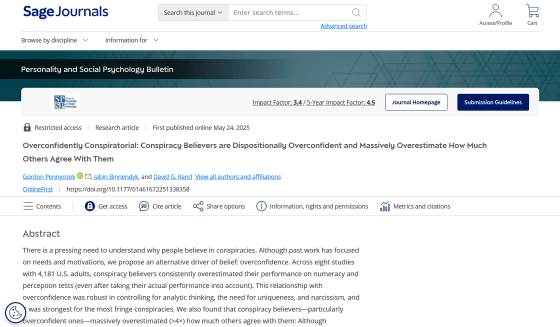Conspiracy theorists overestimate their cognitive abilities and believe others agree with them, study finds

Among the famous conspiracy theories, there are many fantastic ones such as 'The moon landing is a lie,' 'Vaccines contain microchips,' and 'The Earth is flat, not spherical.' Some people may think that people who believe in conspiracy theories are proud of being in the minority. However, a study of 4,181 American adults showed that 'conspiracy theorists tend to overestimate their own cognitive abilities and believe that minority conspiracy theories are supported by others.'
Overconfidently Conspiratorial: Conspiracy Believers are Dispositionally Overconfident and Massively Overestimate How Much Others Agree With Them - Gordon Pennycook, Jabin Binnendyk, David G. Rand, 2025

Conspiracy believers tend to overrate their cognitive abilities and think most others agree with them
https://www.psypost.org/conspiracy-believers-tend-to-overrate-their-cognitive-abilities-and-think-most-others-agree-with-them/
As the number of conspiracy theorists increases and influences politics and society, it is becoming increasingly important to understand the mechanisms that lead people to believe in conspiracy theories. Until now, it has been thought that people believe in conspiracy theories because they want to feel special or to explain social and political events in a way that is consistent with their identity.
However, a research team led by Gordon Pennycook, an associate professor of psychology at Cornell University, hypothesized that conspiracy theorists may overestimate their own intelligence, which leads them to cling to non-mainstream beliefs. Pennycook explains, 'One of the things that characterizes at least some conspiracy theorists is that not only are their beliefs based on poor evidence, but they also seem very confident in their beliefs.'
To investigate whether overconfident people are more likely to be conspiracy theorists, the research team conducted eight experiments with 4,181 adults recruited from the United States. The subjects completed tests to assess cognitive abilities such as numerical reasoning, risk understanding, and perceptual accuracy, and then rated their own performance after the tests.
An 'overconfidence score' was then created by comparing participants' actual test scores with their self-assessments. People who rated their performance highly despite having lower actual scores were deemed to have a higher overconfidence score.

The research team then examined whether overconfidence scores correlated with participants' tendency to support well-known but widely debunked conspiracy theories, such as 'the moon landings were faked' or 'vaccines are a government plot.'
They found that people with higher overconfidence scores were more likely to believe false conspiracy theories, and this association held up even when controlling for other predictors of conspiracy belief, such as poor analytical thinking,
To make sure the results weren't just a reflection of a specific test, the team also conducted a perception test in which participants were asked to look at an image and answer what it was. The images shown in this test were very difficult, and participants had to guess what they saw. However, participants who were more likely to believe in conspiracy theories were more likely to rate themselves as having done well on this perception test.
In addition, when subjects were asked to estimate how many people believed their conspiracy theory, they found that conspiracy theorists believed they were in the majority 93% of the time, even though the average percentage of people who believed in conspiracy theories was 12%. This result suggests that conspiracy theorists not only believe in false theories, but also tend to mistakenly believe that others think the same way they do.
The tendency for conspiracy theorists to falsely identify themselves as in the majority remained even when they were asked to think about groups that were more likely to disagree with them, such as members of an opposing political party. In these cases, they were less likely to estimate that others would agree with them, but conspiracy theorists still overestimated their own beliefs regardless of the group.

Across the studies, participants' overconfidence consistently predicted their tendency to believe in conspiracy theories that were not supported by evidence. Interestingly, this did not hold for conspiracy theories that were later found to be true, such as 'the government surveilled civil rights leaders' or 'unethical medical experiments were conducted.' This suggests that the pattern of overconfidence and conspiracy theory belief is specific to conspiracy theories that are in fact false or untested.
'In general, being overconfident may increase the likelihood of believing in conspiracy theories,' Pennycook told PsyPost. 'Our findings contradict the commonly held belief that conspiracy theorists are aware that they are in the minority and enjoy that fact. For example, even people who believe in very extreme conspiracy theories, such as that scientists are plotting to cover up the truth that the Earth is flat, considered their view to be in the majority.'
However, because participants in this study were recruited through an online platform, it is possible that more extreme and isolated conspiracy theorists may not have been included in the study, and people with stronger distrust of institutions may be less willing to participate in university-sponsored research, so the tendency of the most ardent conspiracy theorists may not have been captured.
Related Posts:
in Free Member, Science, Posted by log1h_ik







